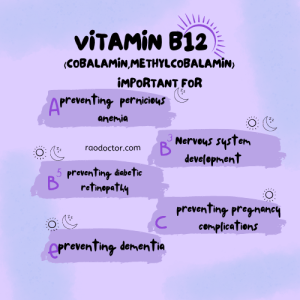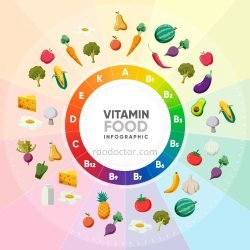Vitamin B12 is an essential nutrient for human health and well-being. It is a water-soluble vitamin found naturally in animal foods, including dairy, eggs, fish, and meat, as well as some fortified plant-based foods. Vitamin B12 plays a key role in the body’s metabolism, energy production, and red blood cell formation. It is also essential for the normal development and functioning of the brain, nerves, and blood cells.
Listen to this article-
Unfortunately, many people are deficient in this important vitamin. A lack of vitamin B12 can lead to a variety of health problems, such as fatigue, depression, memory problems, and even anemia.
Fortunately, vitamin B12 can be easily obtained through diet or supplementation. In this article, we’ll discuss the many benefits of vitamin B12 and why it’s crucial for your health.
Table of Contents
What is Vitamin B12?
Vitamin B12 is a water-soluble vitamin that is essential for human health and well-being. There are two types of B12 vitamins: cyanocobalamin and methyl cobalamin.
While both B12 vitamins have similar health benefits, they each have different bio availabilities, or the degree to which they can be absorbed and put to use by the body.
It’s estimated that 2.4% of the general population is deficient in B12. Vitamin B12 deficiency is especially common among older adults and vegetarians/vegans.
B12 plays a key role in the body’s metabolism, energy production, and red blood cell formation. It is also essential for the normal development and functioning of the brain, nerves, and blood cells.
Sources of Vitamin B12
The best sources of vitamin B12 are meat, fish, and dairy products. If you are a vegetarian or vegan, or if you follow a healthy low-carb diet, you may need to increase your intake of B12.
B12 can be found in fortified plant-based foods, such as soy milk, almond milk, and nutritional yeast, as well as some types of algae (e.g., spirulina, chlorella, and kelp).
Some plant-based foods, such as beans and soybeans, are also B12-fortified. Here are some other good sources of B12: –

- Fish: salmon, tuna, herring, mackerel, trout, cod, shrimps, and sardines. –
- Meat: beef, lamb, pork, liver, poultry, and eggs. –
- Dairy products: milk, yogurt, and cheese. –
- Fortified foods: fortified breakfast cereals, fortified energy bars and fortified instant oatmeal. –
- Mushrooms: shiitake and white button mushrooms. –
- Green vegetables: broccoli, asparagus, and cabbages. –
- Nuts and Seeds: almonds, Brazil nuts, sunflower seeds, and cashews. – Legumes: soybeans, kidney beans, and lentils. –
- Vitamin B12 supplements: you can also find B12 in supplements and B12 shots.
Health Benefits of Vitamin B12
The health benefits of vitamin B12 are numerous. B12 deficiency can lead to a number of health issues, including anemia, fatigue, depression, anxiety, confusion, and nervous system disorders, such as impaired memory, which can lead to issues with concentration and focus.
Here are some other health benefits of vitamin B12: –
- Prevention of anemia: – Vitamin B12 is crucial for normal red blood cell formation. If you’re deficient in this vitamin, it may lead to a reduced number of red blood cells, which can result in anemia.
- Improving mental health: – B12 is essential for a healthy nervous system. Since it is required for the formation of dopamine and serotonin (two important neurotransmitters), a deficiency in B12 can lead to depression and anxiety.
- Preventing cardiovascular disease: – B12 is essential for normal heart function and blood circulation. A deficiency in B12 can lead to cardiovascular issues, such as a decrease in cardiovascular fitness, increased blood pressure, and increased cholesterol.
- Reducing DNA mutation risk: – B12 is important for DNA repair. It can reduce the risk of DNA mutation, which can lead to the development of certain types of cancers.
- Preventing a decline in cognitive function: – B12 deficiency can lead to cognitive decline, including a decline in attention span, focus, and short-term memory.
Vitamin B12 Deficiency Symptoms
If you’re not getting enough B12 in your diet, it can lead to a deficiency, which can cause a number of health issues, from mild discomfort to serious diseases.
Here are some of the most common symptoms of vitamin B12 deficiency: –
- A sore tongue – The tongue is one of the first organs to show signs of B12 deficiency. If you have a sore tongue that doesn’t go away after a few days, it could be a sign of deficiency.
- Fatigue – Vitamin B12 is crucial for normal energy production in the body. When you’re deficient in B12, it can cause a lack of energy and feelings of tiredness.
- Weight loss – A B12 deficiency can also lead to weight loss, even without changes in your diet.
- Mood changes – Another symptom of B12 deficiency is mood changes, including feelings of depression and anxiety.
- Changes in cognition – A B12 deficiency can lead to cognitive decline and issues with memory, attention span, and focus.
- Anemia – A B12 deficiency can also lead to anemia, which is a condition in which there are too few red blood cells in the bloodstream.
- Changes in sleep – A B12 deficiency can also affect your sleep and lead to insomnia.
- Changes in sense of smell – Another sign of B12 deficiency is a reduced ability to smell. Useful resource-NIH
Vitamin B12 and Anemia
When you’re deficient in B12, it can lead to anemia, which is a condition in which there are too few normal sized red blood cells [RBC] in the bloodstream. The RBCs are large in size; hence the anemia is termed megaloblastic anemia or pernicious anemia.

Vitamin B12 is crucial for normal red blood cell formation, so a deficiency can lead to a low number of large red blood cells.
Since red blood cells transport oxygen throughout the body and to the brain, a deficiency in red blood cells can lead to feelings of fatigue, weakness, and even shortness of breath.
Anemia caused by a vitamin B12 deficiency can be treated with supplements or injections of B12 or, in extreme cases, a daily B12 shot.
Vitamin B12 and Mental Health, Nervous system
A deficiency in vitamin B12 can have an adverse effect on both mental health and nervous system function. It is essential for the formation of dopamine and serotonin, two neurotransmitters that are responsible for mood and emotional health.
It is also crucial for the formation of myelin, which is the fatty insulation that surrounds nerve cells and helps them transmit electrical signals.
When you’re deficient in B12, it can lead to problems with cognition and nervous system functions, such as reduced reaction time, impaired memory, and even mental disorders.
B12 deficiency can also lead to neuropathy, which is a nerve disorder that causes tingling and numbness in the extremities.
Vitamin B12 and Diabetes
Vitamin B12 is crucial for normal insulin production, which is important for people with diabetes. A deficiency can lead to a number of health issues for those with diabetes, including obesity [insulin resistance], high blood sugar levels and even type 2 diabetes.
Vitamin B12 levels decreased as the level of glucose intolerance increased and the proportion of those with vitamin deficiency increased with increasing severity of glucose intolerance, more so among males and vegetarians [2].
Springer Link
If you have diabetes and are deficient in B12, you may be at a higher risk of developing diabetic neuropathy, which can cause numbness in the extremities or a loss of sensation in the feet.
You may also be at a higher risk of developing diabetic retinopathy, which is a condition causing blurry vision, reduced eyesight, or visual impairment.
Vitamin B12 and Pregnancy
As we mentioned above, when you’re deficient in B12, it can lead to a number of health issues, including a low birth weight of the baby.
A baby who is born with a low birth weight may be at risk of developing developmental disorders, as well as certain long-term health issues. It is crucial for the normal development of the fetus and the health of the newborn.
A B12 deficiency during pregnancy can lead to complications, including low birth weight, and an increased risk of premature birth of the child.
Medicines that interfere with Vitamin B12 absorption
Vitamin B12 is an essential nutrient that plays a major role in the body’s metabolic processes, so it’s important to make sure you have enough of it.
Unfortunately, there are some medicines that can interfere with the absorption of Vitamin B12 from foods and supplements.
These medicines include some proton-pump inhibitors (such as omeprazole and lansoprazole), some antibiotics (such as metronidazole and chloramphenicol), and some anticonvulsants (such as phenytoin and carbamazepine).
Although the frequency of subnormal vitamin B12 levels did not differ between the study groups, treatment with phenobarbital, pregabalin, primidone and topiramate led to reduced serum levels of vitamin B12
Nature.com
If you take any of these medicines, it’s important to also take a Vitamin B12 supplement to make sure you’re getting enough of the vitamin.
Furthermore, if you’re vegan or vegetarian, it’s especially important to make sure you’re getting enough Vitamin B12 from either supplements or fortified foods like nutritional yeast and plant-based milks.
With a bit of knowledge, you can make sure you’re getting all the Vitamin B12 you need!
Useful resource-
Conclusion-
Vitamin B12 is important for a number of body processes, such as the formation of red blood cells, body cell metabolism, energy production and normal functioning of the nervous system.
A B12 deficiency can cause serious health problems such as anemia and fatigue, so it’s important that people get enough of this essential nutrient.
Fortunately, there are many food sources of B12, including dairy products like milk, cheese, and yogurt; some types of fish like salmon and tuna; fortified cereals and eggs.
If dietary sources are inadequate, people should consider taking a Vitamin B12 supplement to ensure that their bodies have enough of this necessary nutrient.
Final words-
If you have found this article useful, do share it on social media to your friends and relatives using the icons at the bottom of this article. Alternately, you Click to Tweet-
Benefits of Vitamin B12 – Why It's Important for Your Health Click To TweetMy next article will be on another important condition that affect women- Polycystic Ovarian Disease [PCOD or PCOS]. Stay tuned by subscribing to my blogs.
Adios.


